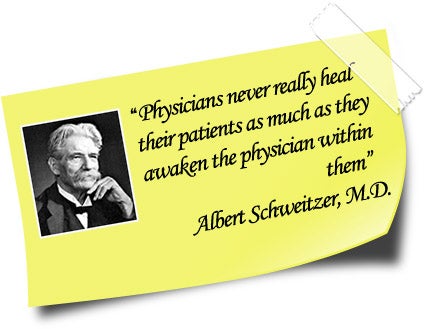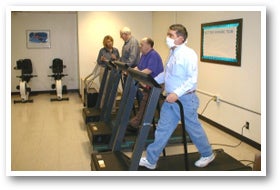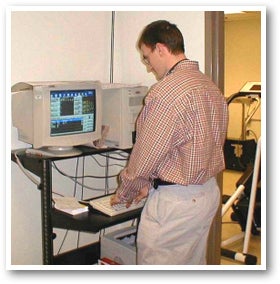Test Menu

Human Performance
Laboratory
|

Exercise Science, M.S. Degree
- 2008 Board of Governors Review (PDF: 3.4MB)
(Download Adobe Acrobat Reader)
Our 2008 report resulted in the Marshall University Board of Governors recommending that the
MS in Exercise Science be continued at its current level of activity.
-
2003 Board of Governors Review (PDF: 0.3MB)
(Download Adobe Acrobat Reader)
Our 2003 Board of Governors Report resulted in the University System of West Virginia Program Review Committee recommending:
"Continuation of the program at the current level of activity, with the designation as a Program of Excellence."
- 1998 Board of Governors Review
Our 1998 Program Review Board of Governors Report resulted in the University System of West Virginia Program Review Committee
approving continuation of the Graduate Exercise Science Program. Dr. Robert F. Edmunds, Coordinator, Program Review and Assessment,
stated "The department is commended for an excellent assessment program."
- 1993 Board of Governors Review
Our 1993 Program Review Board of Governors Report resulted in the Graduate Professional Degree Program Review Committee for the
University System of West Virginia approving continuation of the Graduate Exercise Science Program. Dr. Bruce C. Flack,
Director of Academic Affairs, stated "The committee concurs with the institutional recommendation to continue at the current
level of activity. The Division is commended for providing a well-prepared report."
Seventy percent (70%) of all premature death and chronic
disability could be prevented with appropriate lifestyle changes. This
includes sensible nutrition, exercise, and stopping smoking. An active
lifestyle (Physical Activity and Health: A Report of the Surgeon General)
can significantly reduce all-cause mortality and morbidity as well as
morbidity and mortality from cardiovascular disease (Physical Activity and
Cardiovascular Health: NIH Consensus Statement), diabetes (American Diabetes
Association), osteoporosis, obesity, mental health disorders, and cancer. It
can improve our quality of life as well as increase our chances for
longevity. Because of this awareness and the sky-rocketing cost of
treatment-oriented health care, allied health professionals in preventive
and rehabilitation programs are poised on the threshold of becoming major
players in an approach to health care emphasizing health promotion and
disease prevention rather than a preoccupation with treatment. Allied health
professionals in such programs assist Americans in assuming some
responsibility for their health. The number of such wellness, preventive,
and rehabilitation programs is rapidly expanding. We intend for our
graduates to make strong contributions in these areas.
 |
To help meet this need, the Division of Exercise Science
in the Marshall University College of Education and Human Services offers a
Master of Science degree program in Exercise Science with a (1)
Clinical Applied Area of Emphasis: Adult Fitness and Cardiac Rehabilitation
and an (2) Exercise Physiology Area of Emphasis to prepare students
for careers in the community, hospital and medical center, corporate
wellness, performance enhancement, and cardiopulmonary rehabilitation
settings. Preparation for such positions includes an emphasis on leadership
roles and skills that permit one to work with individuals on a
client/patient continuum from the elite athlete to the cardiac transplant
patient, men and women, the young and senior populations as well as the
recreational athlete and those simply wishing to stay healthy by living
sensibly.
Some Graduate Program Objectives
- Learn and perform policies and procedures for ambulatory Phase I,
Phase II, and Long-term cardiac patients; manage their therapeutic lifestyle interventions for
cardiovascular and related [e.g., diabetes mellitus] disorders.
- Observe imaging at rest and with exercise stress, coronary catheterization,
angiography, ventriculography, coronary bypass graft [CABG] surgery, and percutaneous transluminal
coronary angioplasty [PTCA] procedures. Understand and interpret angiograms and ventriculograms.
- Learn and perform cardiac patient risk stratification that includes ventricular
function, myocardial ischemia, and dysrhythmia variables, including the Lown Classification System.
Consider creatinine, blood glucose, HbA1C, and related clinical variables, including blood counts for
the formed elements and related clinical variables.
- Understand and apply contraindications to exercise testing and exercise therapy.
- Receive training in prepping patients for testing [i.e.,12 lead EKG, XYZ Frank leads,
if possible] and exercise therapy [i.e., bipolar lead setup]; assist with multi-stage exercise testing.
- Develop skills with metabolic assessment of human performance and physical work capacity
[PWC] as well as related clinical variables.
- Develop skills with human performance assessment and performance enhancement.
- Learn and teach exercise prescription for all modalities. Develop skills for managing patients
as they progress through an exercise program. These include preparing patient progress reports and SOAP notes.
- Learn and evaluate lipid profiles to include total serum cholesterol, triglyceride, and
lipoprotein fractions. Include apoproteins and particle density, if possible, as well as electrophoresis
phenotypes, when possible.
- Develop skill in blood pressure assessment as well as teaching patients
heart rate assessment skills.
- Develop background and skills in risk factor awareness and therapeutic lifestyle
management classes [e.g., lipids, HBP, sedentary lifestyle, smoking cessation, obesity, diabetes, family
history, stress, medication awareness, etc.].
- Assist physicians with physical examinations.
- Develop EKG reading skills relative to AV blocks, bundle branch blocks, dysrhythmia,
preexcitation syndromes [e.g., WPW], contour changes, ventricular hypertrophy, etc. Assess patient heart
rates and pulse quality routinely and accurately.
- Understand clinical procedures for determining the occurrence of a myocardial infarction:
symptoms, history, enzymes, and EKG changes. Be informed of contemporary trends in the classification
of myocardial infarction.
- Understand elements of a medical profile and relevance to case study analysis
and development.
- Develop budgeting, business, and logistical skills as well as personnel management
and evaluation perspectives.
- Develop an awareness of Advanced Cardiac Life Support [ACLS] perspectives and
procedures. Pursue ACLS certification.
- Develop an appreciation for “Doctors’ Orders” and standing orders relative to ACLS
and clinical procedures, including exercise prescription, etc.
- Develop a clinical attitude that includes respect for the patient:

Supervising Phase II Cardiac Rehabilitation Patients
(Cardiac transplant patient in the foreground) |
- Develop a scientific attitude, respect for clinical assessment and data,
respect for well-taken heart rate and blood pressure measures as well as the most sophisticated medical procedures.

Student Studying EKG's |
A final, all-encompassing, task is the development of careful, thoughtful, thorough, and responsible attitudes and work habits
that permit consideration of clinical tasks with carefully structured strategies.
|
Recent Master of Science Exercise Science graduates (left to right)
|
Joshua E. Romage, D.P.T., M.S., ATC
Doctor of Physical Therapy
West Virginia University 2009
|
Lisa A. Marsh, M.S., ATC,
FAACVPR
Director,
Health Management Services
Mountain State
Blue Cross/Blue Shield
|
J. Brandon Armstrong, M.D., M.S.
Joan C. Edwards Marshall University School of Medicine
Class of 2010
|
EXERCISE SCIENCE
The School of Kinesiology (SOK) offers graduate degrees in
Exercise Science (M.S.) and Sport Administration (M.S.). Each degree program has distinct areas of emphasis.
The Exercise Science program has three areas of emphasis: Athletic Training; Clinical Applied-Cardiac Rehabilitation;
and Exercise Physiology. The Sport Administration degree program offers two areas of emphasis: Sport Management;
and Recreation and Physical Activity.
These degree programs require from 36 to 39 hours and successful completion of an oral comprehensive examination or
thesis defense. Both thesis and non-thesis options are available.
It is advantageous that students interested in pursuing the Master of Science degree in Exercise Science have a strong
science background, particularly in Biology and Chemistry. Recommended Marshall University courses include BSC 227 Human Anatomy,
BSC 228 Human Physiology, and CHM 203 General Chemistry I or CHM 211 Principles of Chemistry I.
CHM 217 Principles of Chemistry Laboratory I is highly recommended.
Admission in good standing is different for the two degree programs. A personal interview may be required.
Provisional admission to a program is possible, and will be considered on an individual basis. All students
applying must have successfully completed an undergraduate course in either exercise physiology or human
physiology. This requirement should be completed within the first 12 hours of graduate study.
Students are limited to six semester hours of transfer credit from other institutions, and limited to a maximum of
nine semester hours taught at the 500-level. Provisional admission requiring a 3.0 minimum GPA must be attained within
the first 12 hours of graduate coursework. Provisional admission requiring the student to take undergraduate coursework
must be completed within the first 12 hours of graduate coursework.
Consult the Graduate Catalog, for further information. You may also wish to see a related program not included in the catalog,
The High Intensity Training (HIT) Center.
Exercise Science, M.S. Degree
The M.S. in Exercise Science degree prepares students for allied health and medical careers in the clinical, commercial, corporate, community, university, and medical settings. Options include an emphasis on leadership roles and skills that permit one to work with individuals on a client/patient continuum extending from the elite athlete to those with chronic disorder/disease to the cardiac transplantation patient as well as the in between – the recreational athlete and those simply wishing to stay healthy by living sensibly. Options include careers as clinicians in cardiopulmonary rehabilitation and diabetes management programs, as athletic trainers, as exercise physiologists, as well as preparation for other medical fields including physical therapy, pharmaceutical and pacemaker sales, as pharmacists, as physician assistants, as physicians, and for advanced degrees in related doctoral programs.
The course of study for the M.S. in Exercise Science degree is a two-year program with a 36-39-hour requirement. Admission to the program requires a 2.75 GPA, an appropriate undergraduate/graduate background, completion of the GRE, three letters of reference, and admission to the Graduate College.
The Athletic Training Area of Emphasis is designed to meet the needs of the clinical, high school, middle school, college, professional, industrial, and independent athletic trainer. The program is designed to build on existing knowledge and skills the student has acquired in the student’s respective undergraduate program. Elective courses can chose from the approved courses with approval of the student’s assigned academic advisor and/or can be determined by the academic advisor depending on the student’s background, needs, and/or weaknesses. The emphasis in athletic training can be accomplished by a thesis or non-thesis track. Successful completion of oral comprehensive exam/thesis defense is required for graduation. Six hours of the degree may be fulfilled with coursework outside the Division of SOK.
The Clinical Applied Area of Emphasis: Cardiac Rehabilitation focuses on health promotion, disease prevention, and rehabilitation in the clinical, corporate, commercial, community, and medical settings. The course of study has a strong science orientation. Research clearly shows that seventy percent (70%) of all premature death and chronic disability could be prevented with appropriate life-style changes. This includes sensible nutrition, exercise, smoke cessation, and related behavioral changes. Such intervention and risk factor management can significantly reduce all-cause mortality and morbidity from cardiovascular disease, diabetes, osteoporosis, obesity, mental health disorders, and cancer. Our quality of life, as well, can be improved and our chances for longevity increased. Because of the awareness and the skyrocketing cost of contemporary treatment-oriented health care, our graduates are becoming major players in an alternative approach emphasizing health promotion, disease prevention, and rehabilitation.
The Exercise Physiology Area of Emphasis is broadly based upon basic sciences: human anatomy, physiology, chemistry, and biology. Exercise Physiology is chiefly concerned with how the acute and chronic effects of exercise influence various cells, tissues, and physiological systems. Exercise Physiology is a highly integrative field of study that involves examining how the failure or enhancement of one physiological system can influence another. Graduate students have the opportunity to be involved in both applied research and basic science pertaining to the effects of exercise on physiological systems at both the cellular and molecular levels.
Research Course Options
- EDF 517: Statistical Methods
- EDF 621: Educational Research and Writing
- EDF 625: Qualitative Research in Education
- PSY 623: Experimental Design
- PSY 624: Multivariate Analysis
- MGT 500: Analytical Methods and Techniques
- MKT 683: Advanced Marketing Research
Restricted Electives
- ESS 578: Exercise Metabolism
- ESS 585/586/587/588: Independent Study
- ESS 601: Advanced Exercise Testing
- ESS 642: Strength and Conditioning
- ESS 644: Cardiovascular Exercise Physiology
- ESS 645: Respiratory Exercise Physiology
- ESS 646: Neuromuscular Exercise Physiology
- ESS 682: Clinical Perspectives in Rehabilitative and Preventive Medicine
- ESS 516: Facility Administration and Management
- HS 640: Health Evaluation for the Athletic Trainer
- BSC 550: Molecular Biology
- BSC 522: Animal Physiology
- COUN 535: Group Process and Analysis
- COUN 540: Group Theories and Techniques
- COUN 555: Crisis Management
- COUN 577: Stress Management Counseling
- COUN 583: Psychophysiology of Trauma
- COUN 599: Principles and Practices of Counseling
- HCA 600: The Health Care System
Role of the Human Peformance Laboratory (HPL)
The Human Performance Laboratory with its related clinical programs is one of few such laboratories in the country that provides students with opportunities to work in the clinical setting. This means they obtain experience in multi-stage exercise testing with metabolic assessment, learn to develop exercise prescriptions, take blood pressures, read EKGs, check blood glucose readings, and make appropriate assessments. Students also obtain valuable hands-on and problem-solving experience with medical profile development, case study analysis, and client/patient management in a clinical setting.
These clinical programs require mature and responsible behavior in managing patients with multiple medical disorders. The opportunity to work in such a setting is immeasurable as students benefit greatly by directly applying knowledge gained in the classrooms.
In addition, good working relationships have been established with the Marshall University School of Medicine, Cabell Huntington Hospital, Charleston Area Medical Center, Duke University Medical Center, Johns Hopkins University and School of Medicine, and The Cleveland Clinic as well as other regional hospitals, medical centers, and wellness centers across the country. These relationships provide internships and opportunities for realistic appraisal of career choices in the clinical setting.
Our students have experienced success in obtaining employment at these sites across the country and regionally. Most recently, one master's graduate was employed in the Diagnostic Laboratory at Duke University Medical Center and another at The High Intensity Training Center in Lexington, KY. The experience our students gain prior to beginning their internships is an added bonus - it gives them a head start in becoming members of their host institution staff because they do not require as much training as other interns and employees.
Graduate Assistantships
Assistantships are available on a competitive basis and consist of twenty (20) hours weekly scheduled responsibility that may include hands-on experience in the HPL, teaching, and other duties in the department. For further information, contact Dr. Marley at the address listed below.
Contact Information:
|

